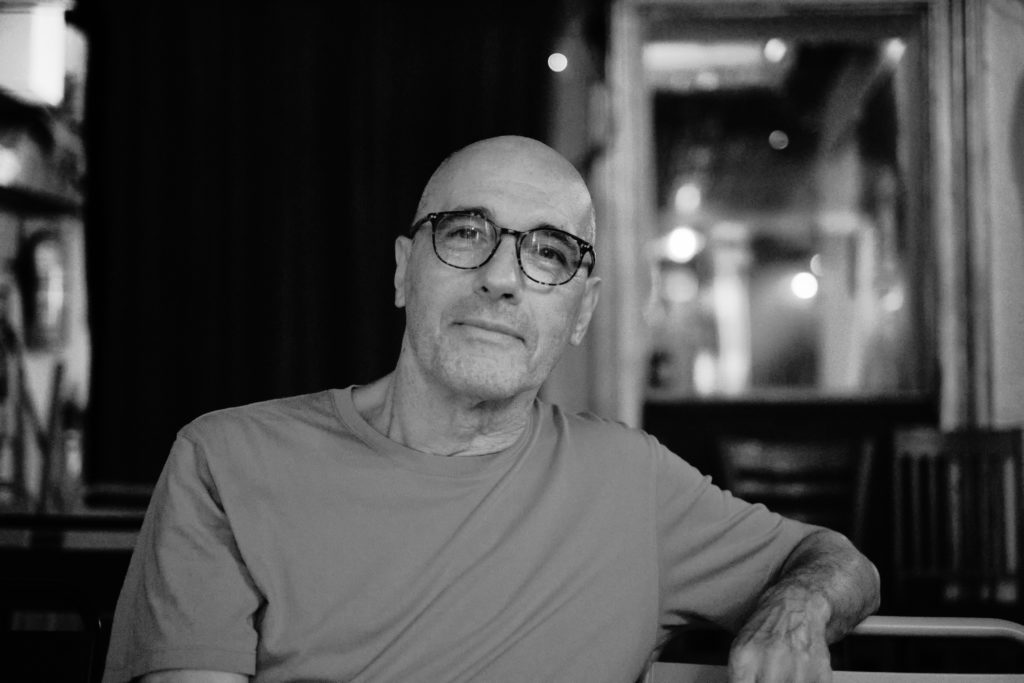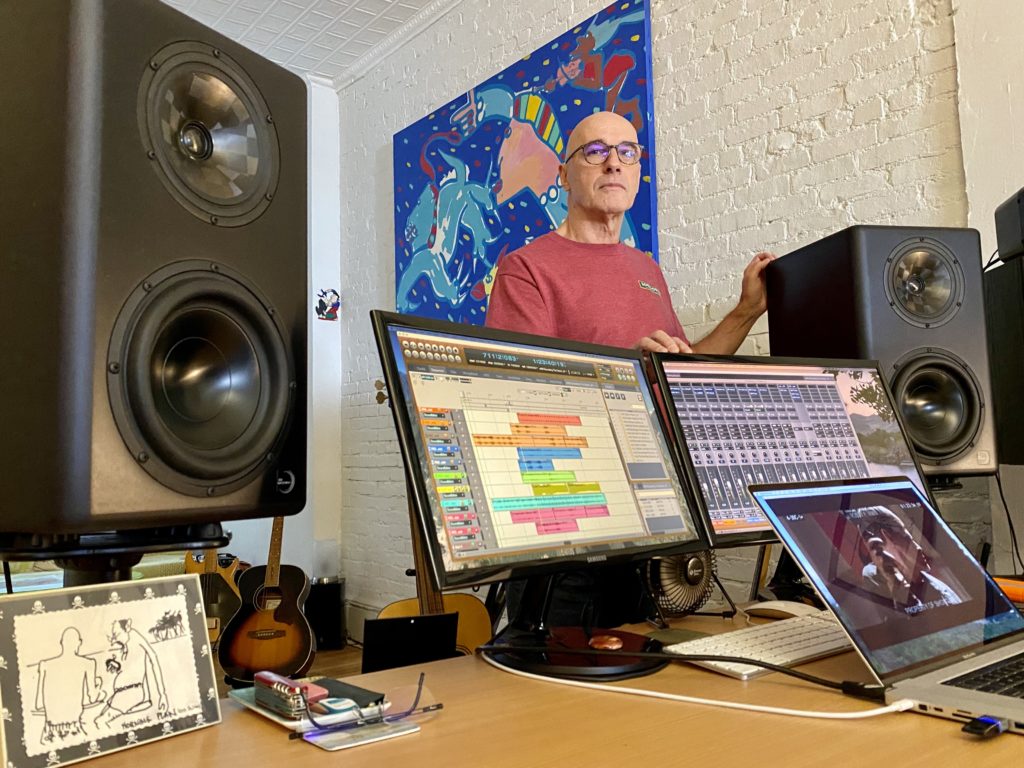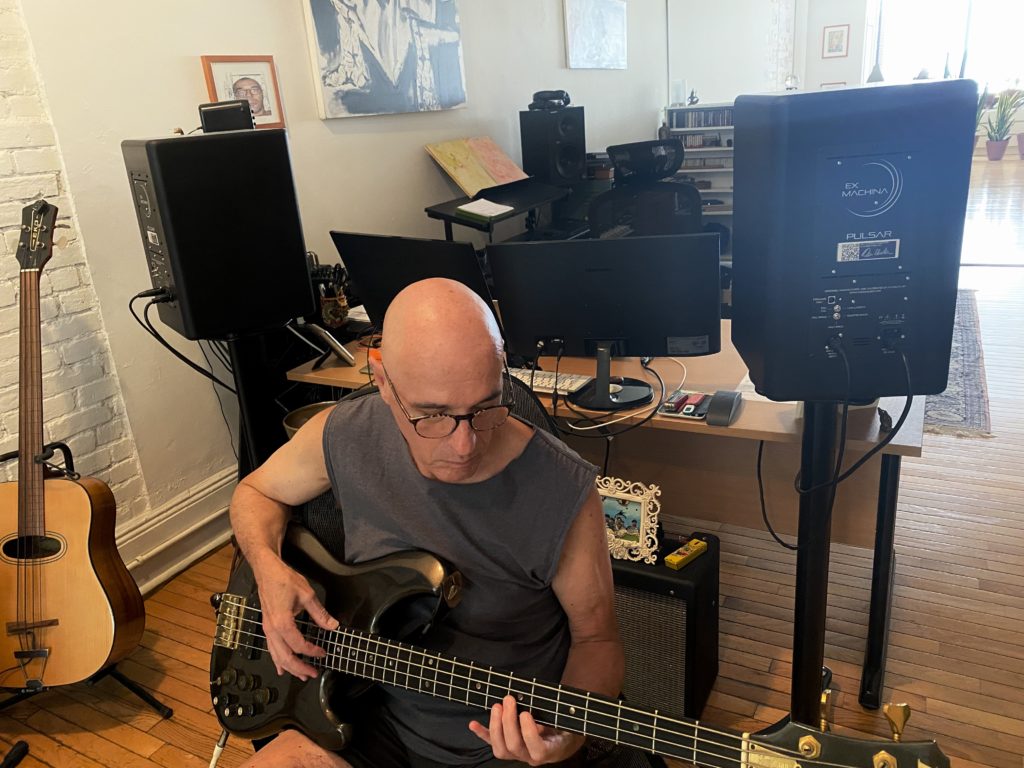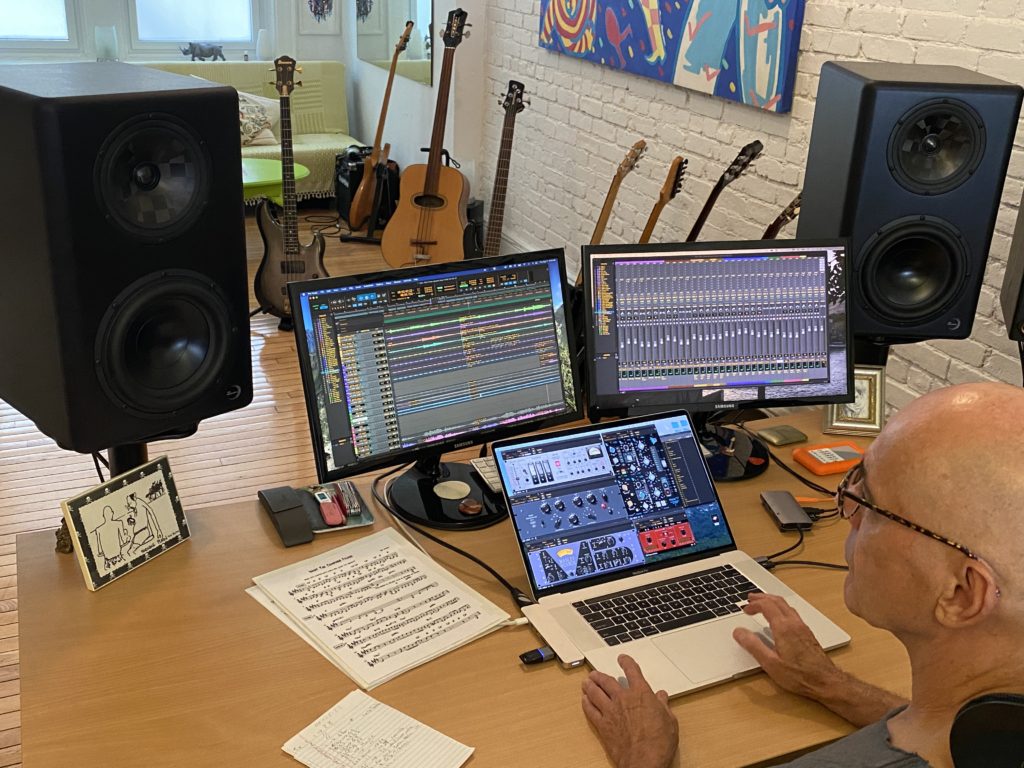Patrick Derivaz depends on Pulsar MKII Monitors from Ex Machina Soundworks to mix the score for Showtime’s “Dexter: New Blood” series
By Brooke Bilyj
Platinum record producer, engineer, composer, and musician Patrick Derivaz has worked on a broad spectrum of projects throughout his career — ranging from classical to jazz to hip hop and rock, from the studio to the stadium and even the silver screen.
“I’ve never been willing to specialize in one kind of music, because I’m too interested in different things,” he says. “If you just accept whatever style is coming at you, then you progress in your life and in your work.”
Born in France, Derivaz’s musical tastes and accolades span around the world. After playing in a rock and roll band as a teenager, Derivaz studied at the Conservatoire d’Aix-en-Provence, where he learned how to compose music, cut tape, and play the upright bass.
Since relocating to New York, where his studio is based today, Derivaz has worked with the likes of John Cale, Philip Glass, Laurie Anderson, A Tribe Called Quest, Jeff Buckley, Will.I.Am, MITSKI, Joe Zawinul, and Tom Verlaine. Beyond the studio, Derivaz has designed sonic elements for the Prospect Park Audubon Center in New York and the Creative Kids Museum in Calgary, Canada, while serving as a front-of-house sound engineer both indoors, at Brooklyn’s Barclays Center, and outdoors, at Central Park’s Summerstage.
Meanwhile, his compositions have been performed on stage with the Guarneri, Juilliard, and Shanghai String Quartets, with recognition spanning from France to the U.S. Along the way, Derivaz also finds time to teach and lecture at New York University and The State University of New York’s Fashion Institute of Technology (FIT), sharing his vast engineering knowledge with the next generation.
Whatever genre and platform he’s working with, Derivaz knows that the smallest sonic details and nuances can affect the entire mood of a musical piece. That’s why he relies on the transparent clarity of reference monitors from Ex Machina Soundworks. In fact, the Pulsar MKII monitor has become essential to his work, wowing clients all the way from the studio to the TV screen — especially with his latest project, mixing music for Showtime’s reboot of the award-winning “Dexter” series.
First Listen
Derivaz’s discography includes engineering, mixing, producing, and playing bass on Ex Machina co- founder Dev Avidon’s first two albums, “She Makes Noise,” in 2007 and “Tears of Men” in 2012. When Avidon came back several years later with Ex Machina Soundworks’ first monitors, Derivaz was all ears.
“Knowing Dev, I knew it was going to be something out of this world because he’s always looking for perfection,” Derivaz says.
As expected, Derivaz was “blown away by the speakers” when he heard them for the first time. “I was listening to some music that I knew for many years from one of the French artists that I really like,” he says. “I was listening to a particular track that I thought I knew very well, and I discovered some things that I’d never heard before, even after working with very high quality speakers in different studios. That’s when I knew I was hearing something really special.’”
Convinced by his initial listening experience, Derivaz added Ex Machina’s first generation Pulsar monitors to his studio in New York. When the second generation MKII came out, he instantly added them to his collection, as well. Today, his Pulsar monitors are situated about four feet apart, three feet away from his mixing position in the studio, where they’re plugged directly into his Apollo interface. Although his collection also includes four sets of other speakers spread throughout his studio, Derivaz depends on the Pulsar monitors to hear every nuanced note of his mixes with unmatched accuracy.
“Throughout the years, I’ve used many different types of speakers — very good quality speakers,” he says. “Some of them are more pronounced on the mid-range, others on the highs or lows, and you learn to work with those. But with the Ex Machina monitors, the frequency spectrum is so even from the low to the mid to the high. Once you listen to the same piece of music on the Ex Machina, you hear the precision and clarity on those frequencies that were lacking on the other speakers.”
Sonic Honesty
While the frequency response of other speakers makes some better suited for pop or rock than others, Derivaz appreciates the versatility of the MKII monitors to handle any genre he blasts through them.
“They don’t discriminate,” he says. “You can give them any kind of music — classical, hip hop, rock, world music — and they’re just going to give you what was recorded. They’re very natural sounding.”
The precision delivered through the Ex Machina monitors sounds exactly like the original recording, for better or for worse. That means Derivaz can hear unwanted noise or mistakes better than before, allowing him to shape the sound he’s after while eliminating extra engineering work on the backend.
“Now that I have these speakers, I know I can trust whatever comes back from them, good or bad,” he says. “In a way, you really want to hear the bad because you can get rid of it at the source, so you don’t have to spend time later on trying to figure out what was wrong or going into surgical EQs. It helps you work faster, and it gives you peace of mind when you don’t have to think about it twice.”
Tighter Turnarounds and Frequencies
That quick decision-making agility pays off, especially when Derivaz is mixing music for film and television — where schedules can be demanding, and files need to be turned around within a day. Aside from the tight timelines, the Pulsar MKII also delivered the frequency extension, phase and timing accuracy, huge sweet spot and ultra-fast transient response that distinguished Derivaz’s work for Showtime’s revival of “Dexter,” an Emmy-nominated and Golden Globe winning crime drama about a vigilante serial killer. While the original series, which aired from 2006 to 2013, was set in sunny Miami, the reboot of “Dexter: New Blood” moved to wintry, upstate New York.
“My challenge as a mixer and producer for ‘Dexter: New Blood’ was to create the tension in the music that would work and match the visuals on screen,” Derivaz says. “It needed to be cold and be felt more than heard. And I was able to do that because I was able to get all those tight, low frequencies. I could hear them thanks to the Pulsar, and I knew they were going to translate well on the soundstage.”
The show’s producers complimented Derivaz on his eerily masterful mixing of the score for “Dexter: New Blood,” with minimal change requests across the 10-episode miniseries that aired between November 2021 and January 2022. “It was a plus for me, and really for the team in general, because they didn’t have to wait to get revisions,” he says, “and it was the Ex Machina speakers that allowed me to do that.”
Now, whether he’s engineering sounds for the studio, stage, or screen, Derivaz knows he can trust every note coming through his Ex Machina monitors.
“Since I like to work on such a wide range of music, the Ex Machina speakers are perfect,” he says. “They’re truly spectacular on all the spectrum levels. If you’re serious about what you record and mix, you should definitely listen to these speakers, because they’ll make your work much easier, faster and more rewarding.”




Comments